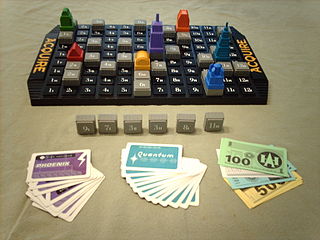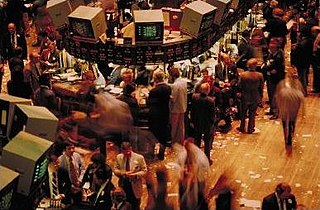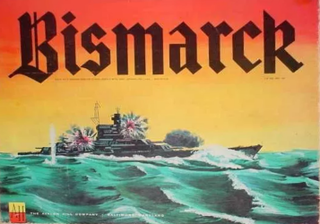Related Research Articles

Acquire is a board game published by 3M in 1964 that involves multi-player mergers and acquisitions. It was one of the most popular games in the 3M Bookshelf games series published in the 1960s, and the only one still published in the United States.

A capital market is a financial market in which long-term debt or equity-backed securities are bought and sold, in contrast to a money market where short-term debt is bought and sold. Capital markets channel the wealth of savers to those who can put it to long-term productive use, such as companies or governments making long-term investments. Financial regulators like Securities and Exchange Board of India (SEBI), Bank of England (BoE) and the U.S. Securities and Exchange Commission (SEC) oversee capital markets to protect investors against fraud, among other duties.

A stock market, equity market, or share market is the aggregation of buyers and sellers of stocks, which represent ownership claims on businesses; these may include securities listed on a public stock exchange, as well as stock that is only traded privately, such as shares of private companies which are sold to investors through equity crowdfunding platforms. Investment is usually made with an investment strategy in mind.
A market trend is a perceived tendency of financial markets to move in a particular direction over time. Analysts classify these trends as secular for long time-frames, primary for medium time-frames, and secondary for short time-frames. Traders attempt to identify market trends using technical analysis, a framework which characterizes market trends as predictable price tendencies within the market when price reaches support and resistance levels, varying over time.

In finance, being short in an asset means investing in such a way that the investor will profit if the value of the asset falls. This is the opposite of a more conventional "long" position, where the investor will profit if the value of the asset rises.

Australian Securities Exchange Ltd or ASX, is an Australian public company that operates Australia's primary securities exchange, the Australian Securities Exchange. The ASX was formed on 1 April 1987, through incorporation under legislation of the Australian Parliament as an amalgamation of the six state securities exchanges, and merged with the Sydney Futures Exchange in 2006.

Day trading is a form of speculation in securities in which a trader buys and sells a financial instrument within the same trading day, so that all positions are closed before the market closes for the trading day to avoid unmanageable risks and negative price gaps between one day's close and the next day's price at the open. Traders who trade in this capacity are generally classified as speculators. Day trading contrasts with the long-term trades underlying buy-and-hold and value investing strategies. Day trading may require fast trade execution, sometimes as fast as milli-seconds in scalping, therefore direct-access day trading software is often needed.

In the stock market, a short squeeze is a rapid increase in the price of a stock owing primarily to an excess of short selling of a stock rather than underlying fundamentals. A short squeeze occurs when there is a lack of supply and an excess of demand for the stock due to short sellers having to buy stocks to cover their short positions.

PanzerBlitz is a tactical-scale board wargame published by Avalon Hill in 1970 that simulates armored combat set on the Eastern Front of World War II. The game, which was the most popular board wargame of the 1970s, is notable for being the first true board-based tactical-level, commercially available conflict simulation wargame. It also pioneered several concepts that would become industry standards.

1914 is a board wargame published by Avalon Hill in 1968 that simulates the first few months of World War I on the Western Front.

Security market is a component of the wider financial market where securities can be bought and sold between subjects of the economy, on the basis of demand and supply. Security markets encompasses stock markets, bond markets and derivatives markets where prices can be determined and participants both professional and non professional can meet.

A stock trader or equity trader or share trader, also called a stock investor, is a person or company involved in trading equity securities and attempting to profit from the purchase and sale of those securities. Stock traders may be an investor, agent, hedger, arbitrageur, speculator, or stockbroker. Such equity trading in large publicly traded companies may be through a stock exchange. Stock shares in smaller public companies may be bought and sold in over-the-counter (OTC) markets or in some instances in equity crowdfunding platforms.

Tactics is a board wargame published in 1954 by Avalon Hill as the company's first product. Although primitive by modern standards, it and its sequel, Tactics II, signalled the birth of modern board wargaming for the commercial market. Tactics is generally credited as being the first commercially successful board wargame.

Bismarck is a board wargame published by Avalon Hill in 1962 that simulates the hunt for the Bismarck.

Stocks consist of all the shares by which ownership of a corporation or company is divided. A single share of the stock means fractional ownership of the corporation in proportion to the total number of shares. This typically entitles the shareholder (stockholder) to that fraction of the company's earnings, proceeds from liquidation of assets, or voting power, often dividing these up in proportion to the amount of money each stockholder has invested. Not all stock is necessarily equal, as certain classes of stock may be issued, for example, without voting rights, with enhanced voting rights, or with a certain priority to receive profits or liquidation proceeds before or after other classes of shareholders.
Axis Direct is the flagship brand under Axis Securities Limited, a subsidiary of Axis Bank in India. Providing Demat and Trading services. Its main offices are in Mumbai. The company employs over 2,100 people.

High-Bid is a board game published in 1963 by 3M that simulates the buying and selling of items via auction. The game was acquired in the mid-1970s by Avalon Hill and re-published under two titles: The Collector and Auction.

Luftwaffe, subtitled "The Game of Aerial Combat Over Germany 1943-45", is a board wargame originally published by Poultron Press in 1969 under a different title, then subsequently sold to Avalon Hill, who republished it in 1971. The game is an operational simulation of the American bombing campaign against Germany during World War II.

Normandy: The Invasion of Europe 1944 is a board wargame published by Simulations Publications Inc. (SPI) in 1969 that simulates the D-Day landings on the beaches of Normandy, and the six days that followed as the German forces tried to prevent an Allied break-out. A second revised edition was published in 1971

Stocks & Bonds is an economic strategy game published by 3M in 1964. The game is a simulation of the American stock market in which players buy and trade fictitious stocks to become the richest by the end of the game. A video game adaptation titled Computer Stocks & Bonds was released by Avalon Hill in 1982.
References
- ↑ "Kriegspiel, Stock Market". The General . 6 (6): 2–3. March 1970 – via Internet Archive.
- 1 2 3 Jackson, Steve (July 1976). "The Stock Market Game" . Games and Puzzles 1976-07. No. 50. A H C Publications. pp. 24–26.
- 1 2 3 Campion, Martin (August 1972). "The Stock Market" (PDF). Moves (4): 18 – via Internet Archive.
- ↑ Turnbull, Don (1970-07-15). "Avalon Hill non-war games". Albion (20): 18 – via Internet Archive.
- ↑ Freeman, Jon (1979). "Stocks and Bonds and The Stock Market Game". The Playboy Winner's Guide to Board Games. Playboy. pp. 21–23. ISBN 9780872165625 – via Internet Archive.
- ↑ Avalon Hill Catalog 1975. Avalon Hill. 1975. pp. 2–4 – via Internet Archive.